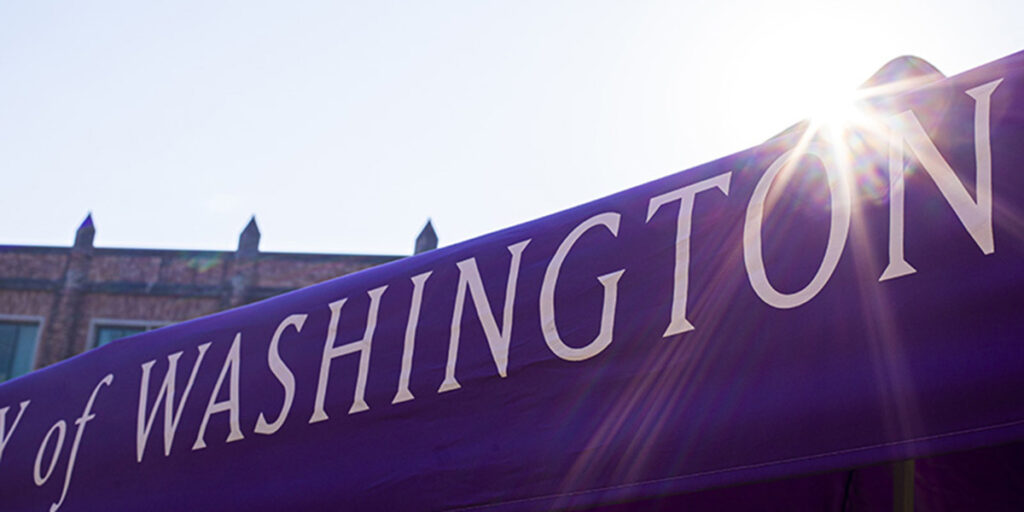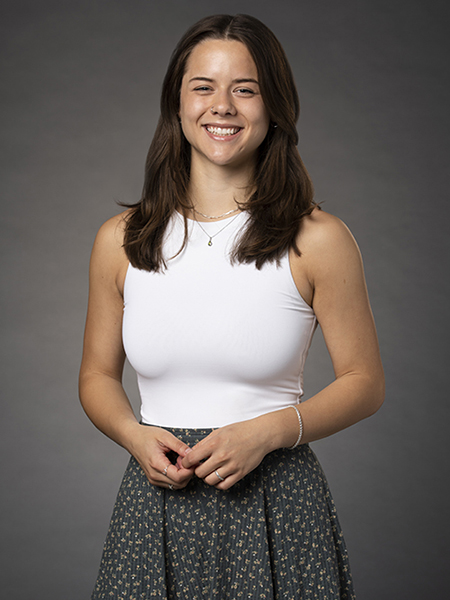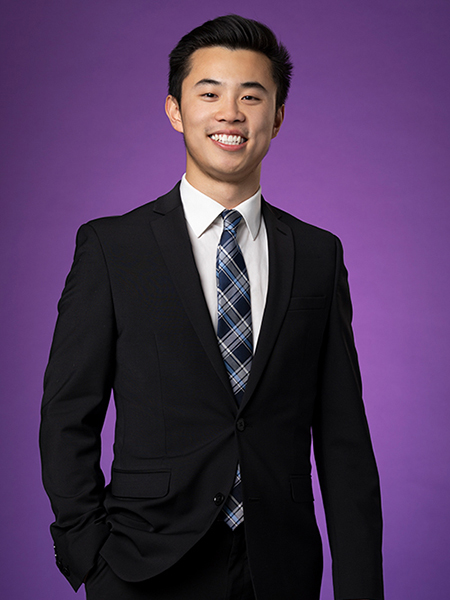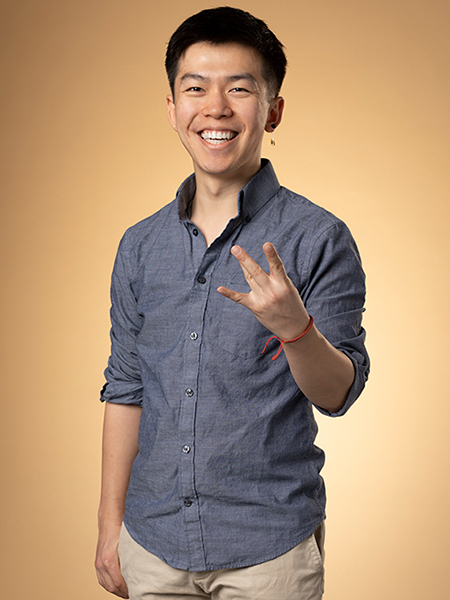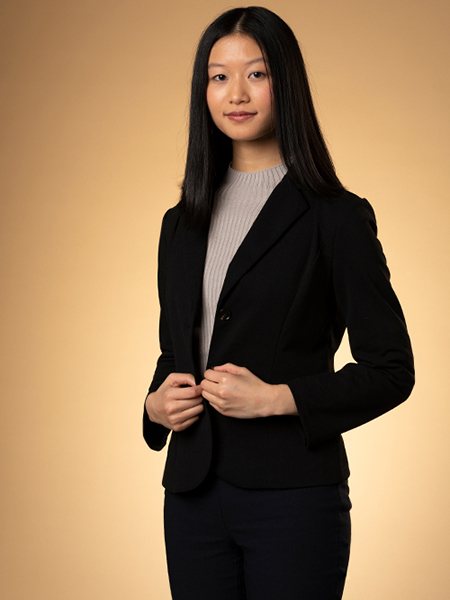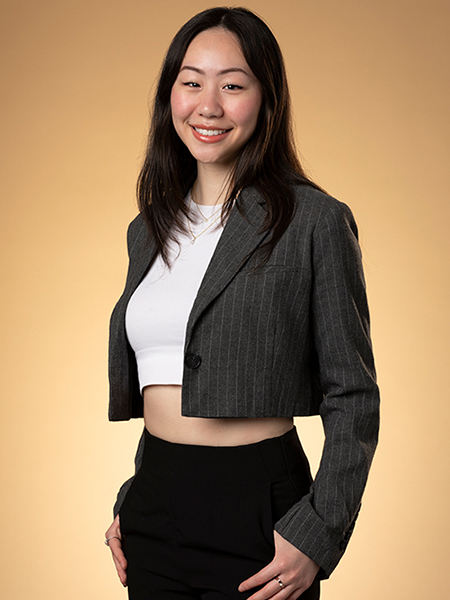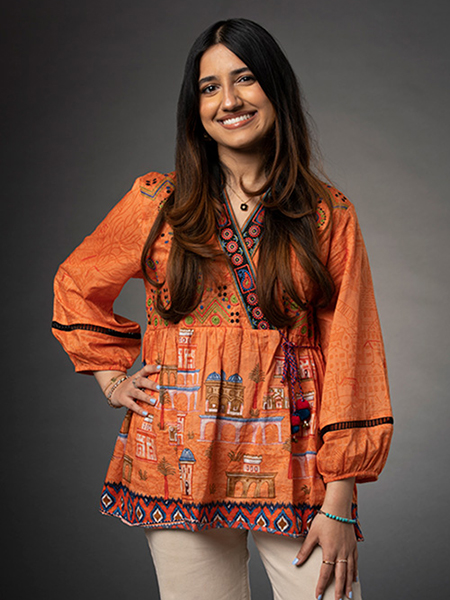Six Allen School students were recently named to the 2023 class of the Husky 100, an honor recognizing undergraduate and graduate students who are making the most of their time at the University of Washington. Husky 100 students make connections in and out of the classroom, making a positive impact on campus and in their communities. This year’s Allen School inductees are living those values, proving Huskies are stronger when in a pack.
Grace Brigham
At the time, the free Welch’s grape juice was probably a bad idea. Yet it turned out to be what greased the wheels for Grace Brigham, whose visits to her father’s office as a youngster featured the dangerous combination of plentiful sugar and groundbreaking technology.
“It felt like a wonderland to me,” she said, recalling the ample, well-stocked food courts.
One day her father showed her what his team had been working on: a touch-screen table. Before the age of iPads, it was like peering through the looking glass for the younger Brigham. The memory, among other things, stuck.
“My dad definitely cringed as I put my probably grape juice-covered hands all over it but I couldn’t help myself,” Brigham said.
The newly minted member of the Husky 100 has made the most of her time at UW through a number of projects and ventures, each putting community and social impact at the forefront.
During her first two years, she worked as a mentor and then a program lead with Changemakers in Computing, a summer program offered by the Allen School for Washington state high school students from marginalized backgrounds. As a sophomore, she co-founded Mezzo, an app that helps plan social meetups, and competed in a number of entrepreneurship competitions with her team.
Now a third-year student, Brigham has continued to make her mark at UW. During the most recent quarter, the Redmond native began working in the Allen School’s Security and Privacy Research Lab, investigating conceptions of consent and acceptability in deepfake technology.
Brigham is set to graduate this fall with her bachelor’s in computer science. When she turns the tassel, a toast might be in order — perhaps one involving that sweet purple potion that helped pique her interest more than a decade ago.
“No matter what, I tried to make the most of my time and I am truly honored to be receiving recognition for that,” Brigham said. “I’m humbled to join a group of such driven, unique and inspiring individuals.”
Eric Fan
Near the beginning of his UW experience, Eric Fan took an introductory programming course that would alter his perspective. He was mesmerized by the ways in which technology could change the world, their capabilities for problem-solving and the theories behind them.
But at the center of it all was the teaching assistant who made the concepts come alive. It was an encounter that Fan would never forget.
“He played a significant role in my success in understanding the course content,” Fan said. “The inspiring way he taught the concepts made a significant contribution to my excitement for computer science.”
Shortly after taking the course, Fan dove into extracurricular activities. He became a teaching assistant himself, developing a passion for education and for making the field more accessible to students from diverse backgrounds. He served on the Allen School Student Advisory Council and became a research assistant for the Ubiquitous Computing Lab. In 2022, he published a book highlighting efforts from individuals and communities who are making CS education more equitable.
“The highlights of my Husky Experience have centered around communities and the opportunities to serve,” said Fan, who grew up in the Seattle area. “Having been invested in by several individuals and communities around me, I’ve been inspired to give back.”
Fan completed his master’s degree in computer science this year and is currently teaching CSE 390B.
“The communities I’ve been a part of, including course staff teams, Allen School student groups and fellowships, have all helped me find my place at a large public university,” Fan said. “I cherish the relationships I’ve developed over the years at UW and am thankful for all the ways they have encouraged me.”
Richard Li
In his high school AP Computer Science class, Richard Li received a smartphone from his teacher with the challenge to “do something cool with it.” The phone ran the first version of Android. There was no documentation or support online.
“Although the coding process was painful, it was also tremendously exciting to see code running on a physical device external to the computer,” said Li, a South Carolina native. “Running code on a physical device opened up new opportunities to interact with the physical world using features such as motion sensors and cameras. This particular facet and interest guided many future decisions, leading to being in a Ph.D. program and my current research areas.”
It was one of Li’s first forays into analyzing how technology could influence its environment and the end user. At UW, he has conducted research in the wearable and ubiquitous computing space, developing human-centered systems in healthcare, physiology and more. On various projects, he’s worked with advisors James Fogarty, Shwetak Patel, Sean Munson, Cindy Lin, George Ionnaou and Philip Vutien. The fourth-year Ph.D. student chose computer science, he said, because he found the major to be inherently interdisciplinary — solutions, even if they are outside of one’s remit, are encouraged.
The prolific academic environment, along with the university’s proximity to many of tech’s biggest players, has helped Li grow as a scientist, he added.
“UW’s incredibly supportive community is renowned, well-known internationally,” Li said. “Being in Seattle opens up opportunities to collaborate with partners in the community as well as in industry. Four years later, I’m happy to report that UW has delivered both of these things.”
Li, who plans to graduate in June 2025, continues to do cool things with technology. Working with a team that included computer scientists, engineers and clinicians, he helped develop Beacon, a handheld device that allows for at-home screening of liver disease. He’s also currently working on the design of a smartwatch band with embedded electronics. The design will allow scientists to monitor how well it fits the user’s wrist, he said, while improving the device’s other capabilities using this measurement. The project is advised by Patel.
For Li, his Husky Experience illustrates his former teacher’s request. After graduation, he plans on pursuing a professorship and teaching students to go out and seek solutions — to “do something cool” with their newfound knowledge.
“I’m honored to be named to the Husky 100,” he said. “It’s rewarding to be acknowledged for the honor of contributing to the UW community, from conducting incredible research to mentoring the next generation of young scientists and engineers.”
Amanda Ong
Amanda Ong entered UW intending to major in biology. But the summer before her freshman year, Ong had an opportunity to work with a team of UW researchers investigating the spectroscopic signatures of nitrogen aggregates in nanodiamonds, proving that diamonds may be forever but plans are rarely written in stone.
As part of the ALVA program, Ong made the most of an opportunity to work in the Li Lab, a computational chemistry laboratory at UW headed by professor Xiaosong Li. There, she marveled at the supercomputer utilized in the experiment and how it powered the project from start to finish. She eventually switched her major to computer science.
“Wow!” she said of her eureka moment. “Programming, which had previously seemed so abstract, suddenly had a concrete application.”
Since then, Ong has become an integral member of the UW community. The Redmond native has fostered her interest in CS education through roles with the Society of Women Engineers and the Association for Computing Education, besides working as a teaching assistant for CSE 160, a course she will teach this summer. Currently, she is working with professor Jeffrey Herron in the Herron Lab to develop a testing framework for the OMNI-BIC microservice, which is a microservice designed to facilitate neuromodulation research.
She’s also empowered members of the greater UW community and beyond. As president of the Seattle nonprofit Young Leaders Program, she introduced several prosocial initiatives, including a virtual career events series and a project with the City of Seattle Office of Labor Standards. For the latter, students worked with minority-owned businesses to educate them on the city’s labor laws.
The fifth-year student completed her undergraduate degree in computer science at UW with a minor in neural computation. She plans to graduate with her master’s in computer science this spring.
“As a student at UW, I am continually inspired by the fearlessness of my peers, faculty and staff in pursuing their beliefs and passions to create a better environment for those around them,” Ong said. “It’s an honor to be selected for the Husky 100 as it recognizes the same qualities I strive to emulate. I’m particularly proud to be representing the Allen School as a part of such a diverse and inspiring cohort of students.”
May Wang
May Wang wears her school spirit proudly. As co-founder of Dawg Outfitters, a UW merchandise startup, she’s engaged in the endeavors of entrepreneurship in addition to helping put other Huskies in cozy hoodies.
The Calgary native’s Husky Experience is defined by warmth — whether that’s in the community or in the type of cloth featured in her company’s merchandise. (It’s a high-stitch fleece.)
“Having my work and involvement recognized by UW not only makes me feel valued as a student and as a leader, but has also given me the opportunity to learn about and appreciate the inspiring contributions of fellow Husky 100 students,” Wang said. “Furthermore, it has allowed me to reflect on my own impact on the community. I hope that my work can be an inspiration to others, encouraging them to pursue their passions and make the most of their Husky Experience.”
Wang, a fourth-year computer science student, has performed a number of roles while at UW. When she’s not programming or investigating better ways to safely store passwords, she takes up mentorship opportunities through her work as a teaching assistant and in the Residential Life department, helping younger students along in their own journeys.
Wang plans to graduate this spring. She said she hopes to continue pursuing entrepreneurship after her time at UW comes to close.
“I am excited to apply my experiences with technology, leadership and entrepreneurship towards my goal of inspiring others beyond the UW community,” she said.
Duaa Zaheer
When Duaa Zaheer first arrived on the UW campus, she felt like a small fish in a pond much larger than Drumheller Fountain. Her high school graduating class had 38 students — a far cry from the more than 40,000 she would soon encounter.
“I started out my experience as an anxious and overwhelmed freshman who didn’t know where she fit in at a school as big as the UW,” Zaheer said. “Over time, I slowly found myself building community and a support network through groups around campus with students sharing the same interests, passions and skills.”
By taking active roles in organizations such as Women in Informatics and Impact++, she’s grown as a leader, helping foster a more inclusive environment and build technology for social good. As president of the Pakistani Students Association, she’s shared her love for her culture through community outreach efforts and programs.
Connecting communities informs Zaheer’s Husky Experience, which will culminate in June when she graduates with her bachelor’s degree in computer science and a minor in informatics. While reflecting on her time at UW, the Redmond native expressed gratitude at staying close to home, while experiencing opportunities that she couldn’t have imagined at the beginning of her freshman year.
One of those included meeting UW’s cuddliest member, Dubs II. At the Husky 100 celebration this year, Zaheer shook paws with the university’s 14th live mascot as an honored guest, hobnobbing with its biggest cheerleader.
For Zaheer, it’s just one of several cherished memories that have been a product of the last four years.
“The Husky 100 is symbolic of the journey I took to reach the well-supported and enlightened point of my college experience I’m at today,” she said. “It is a sign that I’ve left an impact on my school despite how small I felt at the beginning of the journey.”


